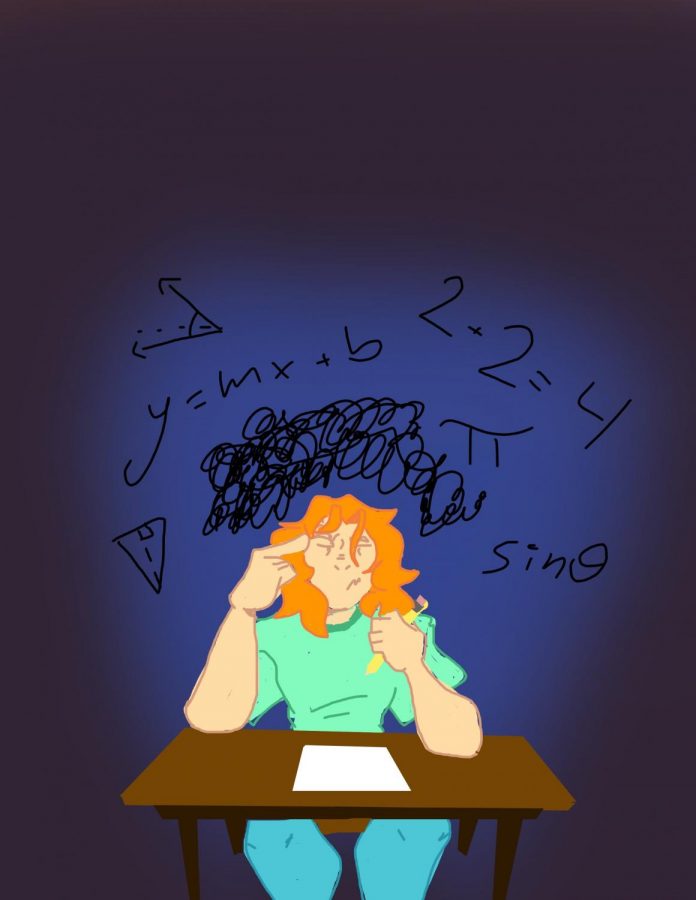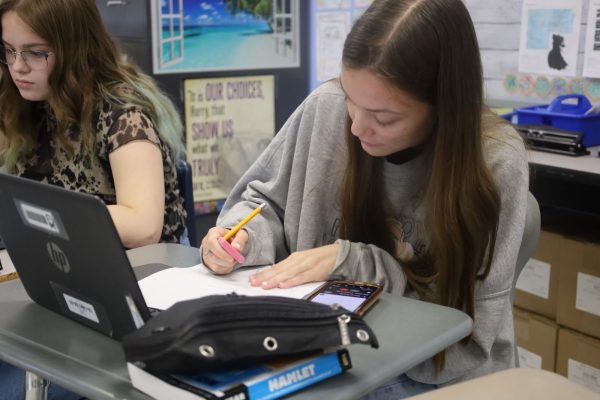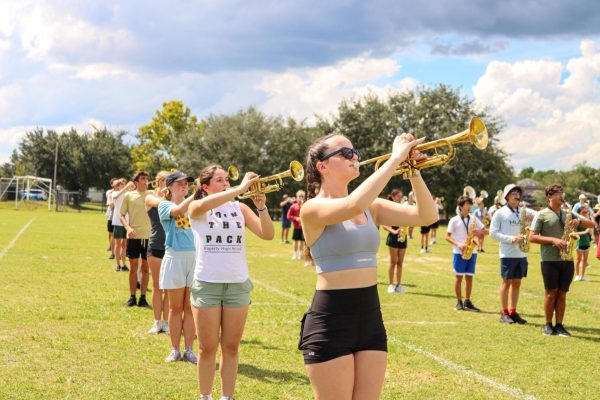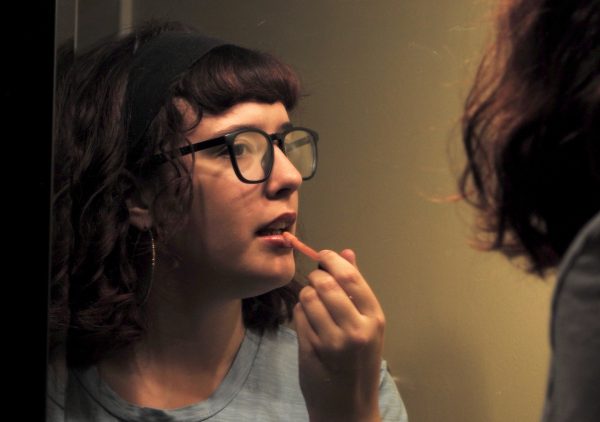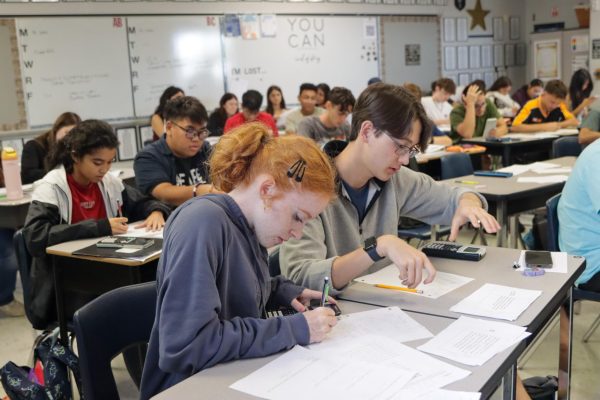Find the solution
Students plead for change within Algebra II department
photo by Emily Patterson
Between parabolas, polynomials and severely high expectations, Algebra II has time and time again proven to have significant problems, causing difficulties in learning important material and being successful in math.
You watch the timer on your virtual quiz. You go to the first question, only to realize you do not understand what it is asking. Trying to find any piece of knowledge to help you answer, you dig through the back of your brain, feeling hopeless.
25 minutes remain. You are only on question four.
You are not a bad student and have always paid attention in class — why is this happening? Is it your fault?
Attention. Your quiz will be submitted in 10 seconds.
You stare at your computer screen in disarray as it displays your score: 37%. Your grade drops from an “A” to a “C.”
This is the distressing and unacceptable reality for many Algebra II students. Between timed quizzes, assignments graded on accuracy and AP Calculus expectations, it is nearly impossible for students to learn effectively — and to pass.
“I realized this class would be hard very quickly,” sophomore Tris Witter-Lowry said, who took Algebra II Honors as a freshman. “I failed multiple tests and quizzes. I had never done that poorly in a class before, and I took it to heart.”
As a mid-level math class with no testing or graduation requirements, this class is more difficult than necessary. Math is generally known to be one of the most strenuous subjects, but the Algebra II department has unreasonable expectations for students.
“This class is fast-paced and rigorous,” Algebra II Honors teacher Aglaia Christodoulides said. “It is as difficult as it needs to be to guarantee success in the future.”
After Algebra II, students are urged to go into Precalculus, followed by AP Calculus. As Algebra II is a prerequisite for both, it is designed to prepare them for the speed and asperity of each course, forcing students to understand advanced Calculus rules. However, according to a poll of 300 students, over 40% opt out of taking Precalculus due to their inability to comprehend the material.
“I believe that every student should be enrolled in Precalculus after Algebra II. A few won’t, but that is most likely due to their perception of their own abilities and word of mouth about the class,” Algebra II Honors teacher Gian Tucciarone said.
Even so, it is important to note that the class is Algebra II — not Calculus. Every course is unique and has its own learning standards that allow for the success of students. The material speaks for itself; there is no need to make it any more tedious or put it on a Calculus level.
“It was really difficult to pick up on the concepts in this class, especially because math isn’t my strong point,” Witter-Lowry said.
The hardest aspects of Algebra II are the quizzes and tests, as is true for many classes. These assessments are administered over specific weekends that correlate with the completion of chapters. Students are given 15 to 20 questions consisting of multiple choice, free response, and fill-in-the-blanks. The stinger is the infamous 60-minute time limit that comes with every quiz. Time is taken away from the hour to scan and upload work, which proved to be a problem for many students during the second quiz, including sophomore Braden Bast.
“The timer didn’t intimidate me at first, but as I read through the questions, I knew I wouldn’t do well,” Bast said. “I spent most of my time stressing about the timer and uploading my work instead of completing the problems correctly. It was the worst experience that I’ve had in a math class.”
The struggles of this class only increase when it comes to the circumstances of Seminole Connect. This virtual option in particular has received much backlash over the past months, and the visual and hands-on subject of math has shown to be arduous through a screen.
“I think that my Seminole Connect students are at a disadvantage just because it’s harder to teach my specific content through a device,” Tucciarone said. “Face-to-face students can walk right up to me, ask questions and get immediate visual feedback.”
The struggles that come with this class cannot be pegged onto the instructors’ ability to teach. All of the Algebra II teachers are praised and appreciated by students, as their methods are straightforward and apprehensible. Their hard work does not go unnoticed. However, the materials they produce are beyond what they teach and cause students to fall behind. Sophomore Tyler Welch agrees.
“Mr. [Michael] Pentz is a really great teacher. He explains problems well and he makes sure that everyone is on the same page before he moves on,” Welch said. “I wish that we could go more in-depth on the notes, though, because they are so much easier than the quizzes.”
With all taken into consideration, the big question is, how can we fix this? Algebra II students have various ideas, ranging from removing time limits to providing deeper explanations on quiz problems. Complaints have been spoken about this course for years, and yet it remains unchanged. Many students have opted into taking Algebra II via Florida Virtual School for the second semester because of the abiding and demanding curriculum.
“I think that the FLVS environment for Algebra II will be a lot better for me,” Bast said. “It’ll be more forgiving than the brick-and-mortar class.”
The problem may be complicated, but the solution is simple: fairness. Giving an Algebra II class AP Calculus guidelines is blatantly arbitrary, as is wording questions in odd ways to spin us in the wrong direction or not accepting the quiz work of those with Wi-Fi problems.
The course notes should be the same rigor as the tests and quizzes, with “concept checks” — mini quizzes — given as a mere supplement. Basic lessons are not enough to work students up to the level of difficulty needed for assessments, given the pace of the class. Additionally, the unreasonable quiz and test time limits are a serious blow to the grades and morale of students, and should be abolished. Students should be tested on how well they know the material, not how fast they can do it. Although the time limits may be to help prepare for the AP Calculus exam, that is not a concern for students two years ahead of time. Again, Algebra II is no more than Algebra II and should not be manipulated like an AP class.
Algebra II has potential to be enjoyable for students, as long as it is taught and graded considerately. Between the stellar teachers and comprehensible material, the problematic nature of the course could easily be reversed.
“This class takes so much more effort than I originally imagined,” Welch said. “But I feel that it will get better with time and change.”
Your donation will support the student journalists of Hagerty High School. We are an ad-free publication, and your contribution helps us publish six issues of the BluePrint and cover our annual website hosting costs. Thank you so much!

